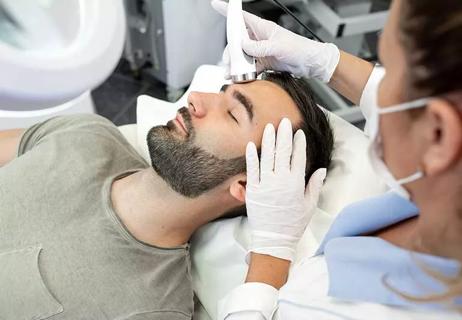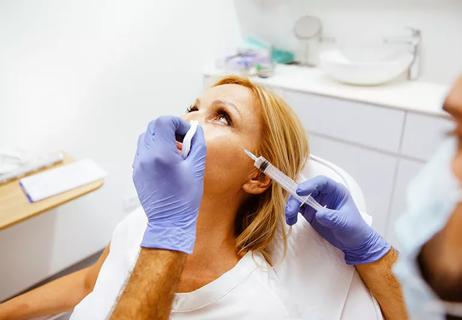Though popular with influencers and celebrities, there’s little research to back up claims that they work

Has this happened to you? When you look in the mirror, you’ve started to notice wrinkles or sagging skin in your reflection.
Advertisement
Cleveland Clinic is a non-profit academic medical center. Advertising on our site helps support our mission. We do not endorse non-Cleveland Clinic products or services. Policy
So, what gives? Could collagen loss be the culprit for your less-than-stellar appearance?
“Collagen is the main structural protein in our skin. It helps the dermis retain its firmness and elasticity. It’s also found elsewhere, like in our bones, tendons and cartilage,” explains dermatologist Shilpi Khetarpal, MD.
“At some point in our 20s, we all start experiencing a steady, gradual decline of our natural collagen ― just how much and how fast depends largely on factors like sun exposure, smoking cigarettes and air quality. As we lose collagen, our skin becomes drier and more wrinkled.”
So, what can you do? Should you start taking collagen supplements?
Collagen supplements — which have been touted by social media influencers and celebrities — come in different forms: powder, capsules or gummies.
But you may want to think twice before you start working collagen supplements into your daily routine.
Dr. Khetarpal explains whether you’ll see a difference from using collagen supplements and offers up some other ways to keep your skin in its best shape.
Video content: This video is available to watch online.
View video online (https://cdnapisec.kaltura.com/p/2207941/sp/220794100/playManifest/entryId/1_wr15ryfs/flavorId/1_5f3sgelj/format/url/protocol/https/a.mp4)
Learn the potential benefits of collagen supplements.
Collagen supplements aren’t the best option if you want to improve the appearance of your skin. That’s mainly because there’s no evidence-based science to prove they work — or that they’re safe.
Advertisement
“A few small studies have shown limited improvement in skin texture with collagen supplements,” notes Dr. Khetarpal. “But it’s important to point out that they’re all manufacturer-sponsored studies. And unfortunately, the supplement industry isn’t well regulated and has a history of inaccurate labeling and contamination.”
You may be curious about why collagen supplements don’t work. Dr. Khetarpal says that collagen supplements are mostly absorbed by your GI tract, which means that there isn’t enough collagen that makes it into your bloodstream to be delivered to your hair, nails and skin.
Another factor? Most supplements are made with animal collagen and it’s unclear whether this form of collagen is close enough to human collagen to be beneficial.
Fans of collagen supplements claim that they may:
But remember: Research doesn’t necessarily back up the benefits of collagen supplements.
So, how long would it take for collagen supplements to work?
You’ll need to manage your expectations if you choose to try collagen supplements. It can take three to six months of use before you may begin to see results.
The processed form of collagen, which may be called collagen peptides, comes from animal tissue discarded by meat processors. This substance is ground into a gelatin or powder and placed in a capsule or gummy tablet, along with other sometimes-unnamed byproducts. With the increasing number of food allergies today, this is a critical consideration.
Should you watch for any side effects if you decide to take collagen supplements?
Overall, the side effects of collagen supplements are minimal. You may experience the following:
There are countless brands and options of collagen supplements available. If you want to try collagen supplements, you should follow the manufacturer’s directions. A daily dose may be anywhere from 2.5 to 15 grams.
If you’re using collagen powder, you can add it to your protein shakes, coffee and even smoothies.
You may want to also consider the cost of collagen supplements — especially if you take them daily. It can be a costly endeavor that may not add up to any meaningful results.
Collagen supplements may not be the best line of defense in keeping your skin looking its best. But Dr. Khetarpal says there are other options out there.
Advertisement
You may want to consider procedures ― like microneedling ― which are performed by board-certified dermatologists to stimulate collagen. Your dermatologist may also suggest vitamin A-based topicals, such as tretinoin (Refissa®, Renova® and Retin-A®), which have shown in scientific studies and extended practice to be effective.
And most importantly? There are small things you can do each day to protect your skin.
“If we want to slow down the loss of collagen, it’s best to know and avoid environmental hazards. Specifically, stay away from cigarettes and other harmful toxins, consistently apply sunscreen and wear hats and other protective clothing when outdoors,” advises Dr. Khetarpal.
“It’s also helpful to use topical antioxidants (like vitamins C and E) to protect against external aggressors like smoke and UV rays. Lastly, it’s very important to stay well-hydrated. That means drinking at least 64 ounces of fluids every day.”
Advertisement
Learn more about our editorial process.
Advertisement

Topical treatments — and even some cosmetic procedures — may help reduce the appearance of this crinkled-paper look

This noninvasive procedure can help aging skin by boosting collagen production

Your blood vessels shrink and your skin forms wrinkles to help you grip objects

Try limiting heat styling and eating a healthy diet instead

Lifestyle changes, neck exercises, injections and surgery can all help improve turkey neck

Using tape to smooth wrinkles may be a temporary fix, but there are still risks

What you can do for laugh lines and facial creases

They're less invasive and less time-consuming than other options for the padding beneath your eyes

Wearing a scarf, adjusting your outdoor activities and following your asthma treatment plan can help limit breathing problems

Your diet in the weeks, days and hours ahead of your race can power you to the finish line

When someone guilt trips you, they’re using emotionally manipulative behavior to try to get you to act a certain way